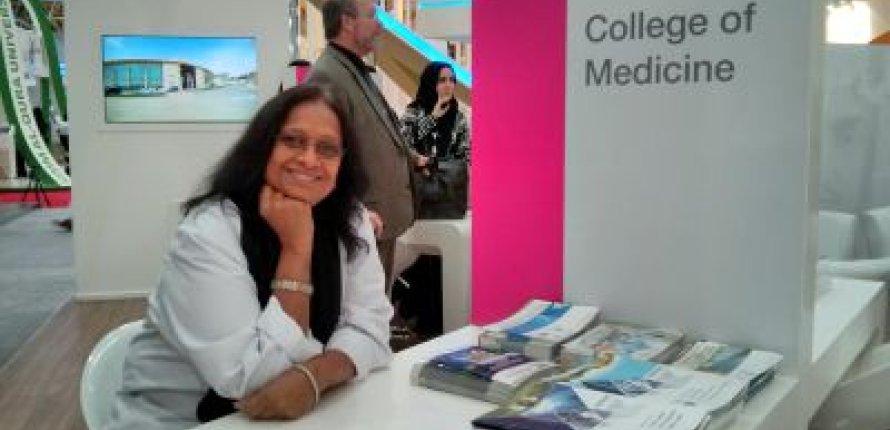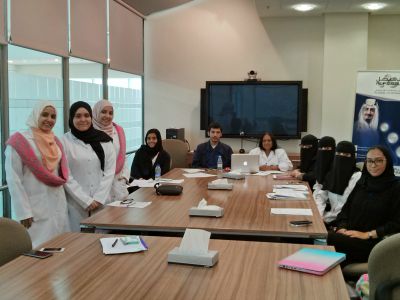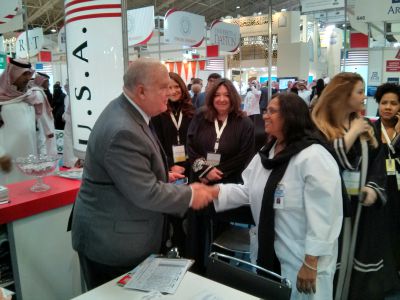How My Fulbright Experience in Saudi Arabia Made Me More Flexible and Creative

Suhasini “Susie” Ramisetty-Mikler, Assistant Professor of Epidemiology at University of North Texas
2014-2015 Core Fulbright U.S. Scholar to Saudi Arabia
It has been lifelong dream of mine to be a Fulbrighter. I once had a student from Saudi Arabia in my university’s master’s program in public health and having never met anyone from Saudi Arabia before, it piqued my interest in the country. Saudi Arabia is a country where a woman’s life is very restricted, making it particularly difficult population to be engaged in research, so I wanted to explore how their culture influences women’s health.
 Group picture with students during the research training session with 3rd year medical students
Group picture with students during the research training session with 3rd year medical students
I began my ten-month Fulbright journey in August 2014 as a Fulbright U.S. Scholar to Saudi Arabia in order to build international goodwill and mutual understanding through the teaching and research of prenatal care. After a warm welcome by the Alfaisal University medical school dean and other faculty, I began teaching epidemiology and a health research course to third-year medical students, as well as guest lecturing in other classes. At first, I didn’t really see much difference between the academic system in Saudi Arabia and back home in the United States, other than gender segregation. For example, I taught the same material for the same class twice; first to a male section and then a female section, each with over 100 students. There are also male-only and female-only floors and segregated male and female faculty offices at the university, which made communication and the engagement of female faculty in the decision-making process difficult. This has posed a significant challenge to communication between faculty and the involvement of women in the departmental decision-making process, such as sharing the workload and who teaches what courses.
Apart from teaching, the primary purpose of my research work was to understand how young Saudi women perceive preconception and prenatal health as it relates to birth outcomes. I developed a survey focusing on young mothers’ knowledge on the importance of proper nutrition, particularly diets that are rich in micronutrients and vitamins, like folic acid and maintaining physical activity and good health. It was a cross-sectional study that involved government hospitals in Riyadh. Mothers were interviewed face-to-face to collect data on their pre-conception and prenatal exposures, nutrition/diet, and exercise behavior.
 U.S. ambassador to Saudi Arabia, Joseph Westphal.
U.S. ambassador to Saudi Arabia, Joseph Westphal.
From my personal experience, I would advise anyone who would want to conduct research to be aware of the cultural differences one may face. For example, compared to the United States, I had to go through a lengthy process of obtaining permission from each of the Saudi Arabian hospitals, which took several months to receive. Trying to convince potential investigators to collaborate on a project puts a lot of responsibility on them to oversee the process in addition to their regular workloads. Another challenge was training willing Arabic speaking students to conduct the interviews. As the students assisting with data collection are volunteers, I was cognizant not to place too much demand on their time, which slowed down the data collection process. Eventually, four hospitals in Riyadh agreed to participate and help in recruiting pregnant Saudi women. One of them continues to actively collect data. Before leaving Saudi Arabia, I entered all of the available data; further data collection by the medical interns will continue. I expect that the data collection will continue through the Fall semester which will give me enough sample for meaningful data analyses and professional publications.
Though my Fulbright grant has ended, my partnership with Saudi Arabia continues on a personal interest level. I am in the process of helping Dr. Pal, professor of Public Health at Qassim University, in establishing a Public Health Master’s Program. I reviewed the draft and critically evaluated the course content and sequence. My research collaborators and I plan to continue our work. For example, Dr. Abdulkarim Almakadma, Professor of Clinical Medicine at Alfaisal University in Riyadh and I submitted two research articles on youth risk behavior for publication and we are working on a grant to address parental stress and coping in raising a child with autism, which will be submitted for funding. I am also working with Dr. Fatimah at King Faisal Specialist Hospital in analyzing data on Human Papilloma Virus (HPV) to determine the prevalence of HPV infection in females and to examine the effect of the sociodemographic characteristics as being risk factors toward the HPV infection that might lead to cervical cancer. This paper will be submitted for publication in a reputed research journal.
One last piece of advice to future scholars interested in Saudi Arabia: learn the language and the culture. Language can be a major barrier to conducting research in Saudi Arabia. Although English is used for classroom instruction, people prefer to converse in Arabic. It would be advantageous to know Arabic, for example, when one is out shopping or conversing with taxi drivers.
My Fulbright experience in Saudi Arabia certainly taught me how to adapt to a different culture as a woman. It helped me develop contingency plans to continue my research project after my departure. It made me more flexible and creative in solving my obstacles and in achieving my teaching and research goals.
